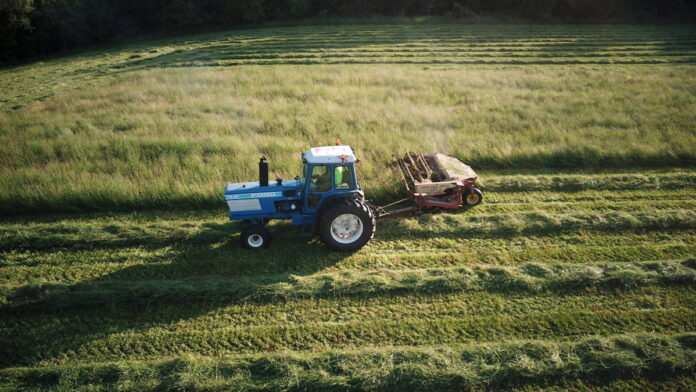
DARLINGTON, Pa. — Life is back to normal for farmers in rural western Pennsylvania, just across the state line from where a train derailed and caught fire in East Palestine, Ohio, earlier this year.
It’s been nearly four months since the Norfolk Southern train derailment Feb. 3 that resulted in five tank cars of vinyl chloride being vented and burned off, sending a plume of black chemical smoke high into the sky and onto surrounding farms. That’s become the image associated with the train derailment for people living outside the region.
But for farmers living and working in the rural areas surrounding East Palestine, it’s been like any other spring. In the last week of May, many of them were finishing planting and making hay, trying to take advantage of the unusually long stretch of dry weather before Memorial Day. That’s what Sam Kuhlber was doing.
“I’m operating as normal,” said Kuhlber, a farmer in Darlington Township, who plants row crops and raises some beef cattle. “I always had a gut instinct that things were fine. It was one incident. It was brief. I’ve always felt comfortable that things are OK. Now, we have the data to provide it.”
Good results
According to government sources, field crops and soil in fields around the derailment were not contaminated by the initial fire or subsequent chemical burn.
The Ohio Department of Agriculture and Ohio State University on May 16 released final results from plant tissue sample testing on crops within five-mile radius of the derailment. The samples showed plants did not contain semi-volatile organic compounds associated with the train derailment, according to an Ohio EMA press release.
These results came a few days after the U.S. EPA posted final soil test results from samples taken at agricultural, residential and recreational properties throughout the area that also showed no contamination from the derailment.
“The picture coming together is that the particles have not created a noticeable burden of contaminants on people’s properties,” Mark Durno, EPA response coordinator, told Farm and Dairy. “Our advice at the EPA is to continue to use properties as you typically would.”
Plants and soil
The 31 plant tissue samples were taken between April 10-12 from winter wheat, pasture grasses, malting barley and forage covers from sites in Columbiana County. All samples were analyzed for the same 26 selected semi-volatile organic compounds the U.S. EPA has been testing for in soil samples.
Results from plant tissue samples taken in Pennsylvania by the Pennsylvania Department of Agriculture are expected back soon.
Initial soil test results from samples taken by the Pennsylvania Department of Environmental Protection in March at 15 farms in Beaver and Lawrence counties showed no volatile organic compounds and semi-volatile organic compounds and dioxin levels within expected background concentrations.
Samples taken by the EPA and Norfolk Southern contractors show similar results, Durno said.
Dioxin was a particular concern for some farmers because of how it settles in the environment and is stored in animal tissue. Dioxin is a carcinogenic chemical compound that is a byproduct of combustion and found throughout the environment at low levels.
“Everything was at the low end of what we consider typical, which is great news,” Durno said.
All of the validated data from those sampling and testing efforts are on the EPA website at: epa.gov/east-palestine-oh-train-derailment/epa-residential-commercial-and-agricultural-soil-sampling.
Back to normal
While things are back to normal on farms, some farmers are still stinging from the delayed response by government agencies, which in some cases resulted in a loss of business.
Though initial environmental testing pointed to no contamination issues, and state agencies maintained that crops, livestock and other animal products should be safe, consumer confidence took a hit early on. More testing was needed to reassure people that local agricultural products were safe, said Cliff Wallace, president of the Beaver-Lawrence Farm Bureau.
Kuhlber had cattle scheduled to go to the butcher shortly after the derailment. He said he had people back out of sales because they were nervous.
“Our biggest detriment is the loss of customers and loss of faith in the quality of our products because of this thing,” Kuhlber said.
More than a month passed before the EPA and DEP announced they would test agricultural lands outside the immediate 1-2 mile ring around the derailment. State and federal agencies said they had limited resources and manpower with which to spread around the area, and initial data did not indicate a need to test further afield.
Testing came only after the agencies received pressure from the local farm bureau, farmers, elected officials and the community. The first soil test results came back 47 days after the derailment.
“The optics were really bad,” said Alex Leslie, a dairy farmer in Enon Valley, Pennsylvania, another town close to the derailment. “You have this situation where you don’t know what’s going on.”
Now that they do know what’s going on, it’s given Leslie some peace of mind. He runs a pasture-based dairy farm with his wife and parents, as well as working at a nearby orchard.
He feels good about the soil test results taken from his farm by the government agencies. He also had separate soil testing done by the FreshWater Accountability Project, which have shown similar results to the DEP and EPA. It all lines up with what he’s seeing with his own eyes on the farm, which is that everything looks fine. Cattle are healthy. The grass is growing. The sun is shining.
“The grass looks good,” he said. “A little more rain would be nice, but we’ll do what we can with that.”
(Reporter Rachel Wagoner can be reached at 724-201-1544 or rachel@farmanddairy.com. The farm she manages with her family, in Darlington, Pennsylvania, was one of the farms sampled by the DEP and EPA.)
Related content
- Crops not contaminated by East Palestine train derailment: state
- Test results show soil is safe at Pa. farms after train derailment
- EPA expands soil testing on farms around train derailment site
- Questions remain about environmental impact of East Palestine train derailment
- Community steps in to help farmers near East Palestine train derailment
- Rural Pennsylvanians feel forgotten in response to train derailment
- Donations arrive from Indianapolis for farmers, pet owners affected by train derailment









